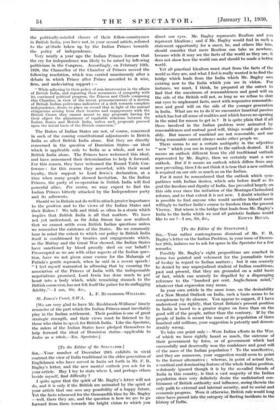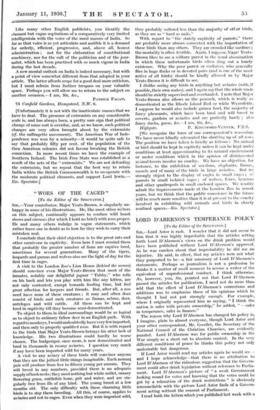[To the Editor of the SPECTATOR.] SIR,—Your rather contemptuous dismissal
of Mr. F. R, Bagley's letter on the Indian Problem, in your issue of Decem- ber 28th, induces me to ask for space in the Spectator for a few remarks.
Possibly Mr. Bagley's eight propositions are couched in terms too pointed and vehement for the journalistic taste of to-day in regard to Indian matters ; but it can scarcely be denied by any unprejudiced student of Indian conditions. past and present, that they are grounded on a solid basis Of fact, which can scarcely be dispelled by a disparaging reference to the "hundred per cent. Anglo-Saxon mind," whatever that expression may mean.
In your own article in the same issue, on the desirability of a New Mental Outlook on India, such a basis seems to be conspicuous by its absence. You appear to suggest, if I have understood you rightly, that Great Britain's present position in India is based to a greater degree on force than on the good will of the people, rather than the contrary. ' If by the people of India is meant the mass of its population of three hundred odd millions, your suggestion is patently and demon- strably wrong.
To take one point only :—Were Indian efforts in the War, of which we have rightly heard so much,• the outcome of their governinent by force, or of government • which had successfully and deservedly won the confidence and good will of the mass of the Indian population ? To the unreflective, and they are numerous, your suggestion would seem to point to the former alternative ; whereas, in point of actual fact, a cardinal and dominating feature of the whole Indian position, scdulously ignored though it is by the so-called friends of India in this country, is that a vast majority of the Indian population does very definitely desire the undisturbed con- tinuance of British authority and influence, seeing therein the only path to external and internal security, and to social and economic progreas. Wete it otherwise, British rule would long since- have passed into the category of fleeting incidents in the hfstOry of India.
- .
Like many other English publicists, you identify the clamant but vague aspirations of a comparatively very limited intelligentsia with the voice of the rural masses of India. So far as that voice is as yet articulate and audible it is a demand for orderly, efficient, progressive, and, above all, honest administration ; not for the elaboration of constitutional machinery, nor for the cult of the politician and of the jour- nalist, which has been practised with so much vigour in India during the last decade.
A new mental outlook on India is indeed necessary, but with a point of view somewhat different from that adopted in your article. The latter affords scope for a good deal more criticism, but I must refrain from further trespass on your valuable space, Perhaps you will allow me to return to the subject on another occasion.—I am, Sir, &c.,
PATRICK PAGAN.
73 Canfield Gardens, Ilampstead, N.W. 6.
[Unfortunately it is not with the inarticulate masses that we have to deal. The presence of extremists on any considerable scale is, and has always been, a pretty sure sign that political change of some sort is overdue, and, as we know, such political changes are very often brought about by the extremists (cf. the suffragette movement). The American War of Inde- pendence was won by a minority—it would be quite safe to say that probably fifty per cent. of the population of the then American colonies did not favour breaking the British connexion. In more recent times we have the example of Southern Ireland. The Irish Free State was established as a result of the acts of the " extremists." We are not defending the extremists, but we repeat that the best way to retain India within the British Commonwealth is to co-operate with the moderate political elements, and support Lord Irwin.— ED. Spectator.]







































 Previous page
Previous page